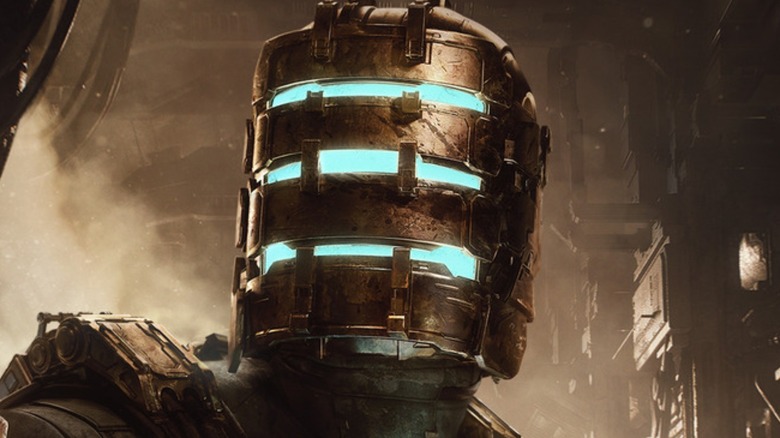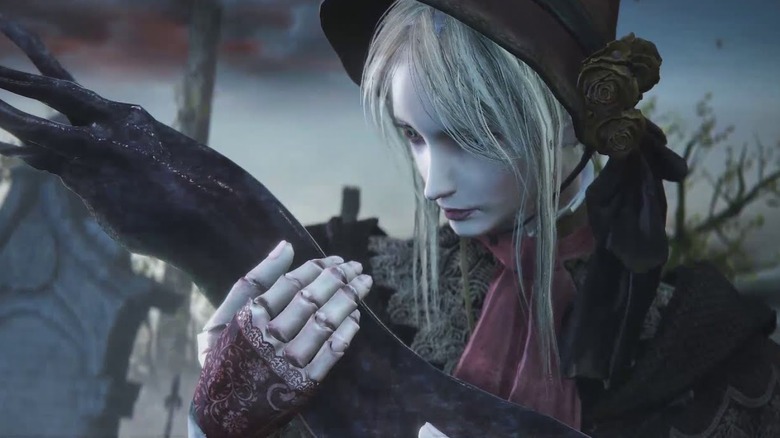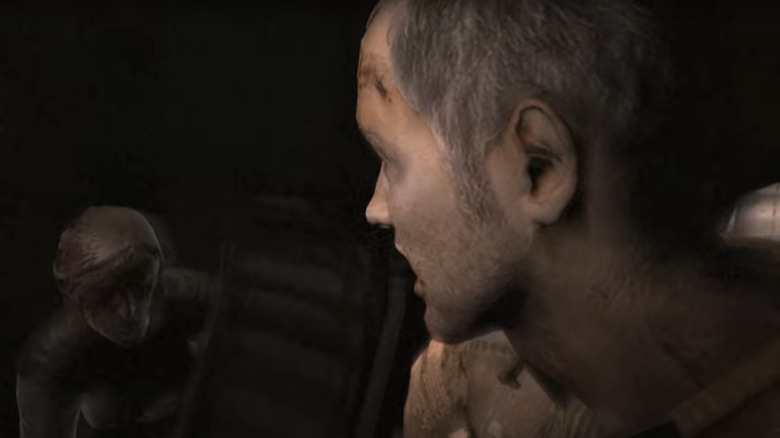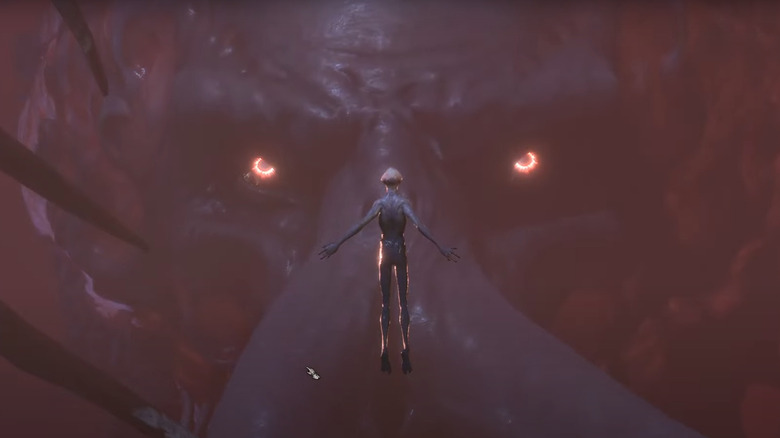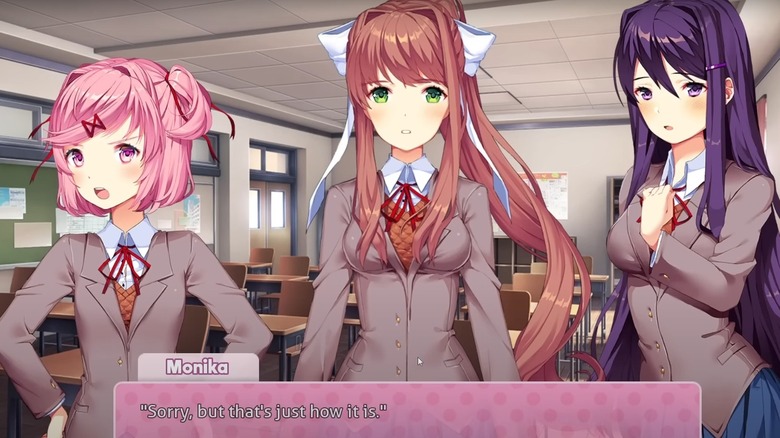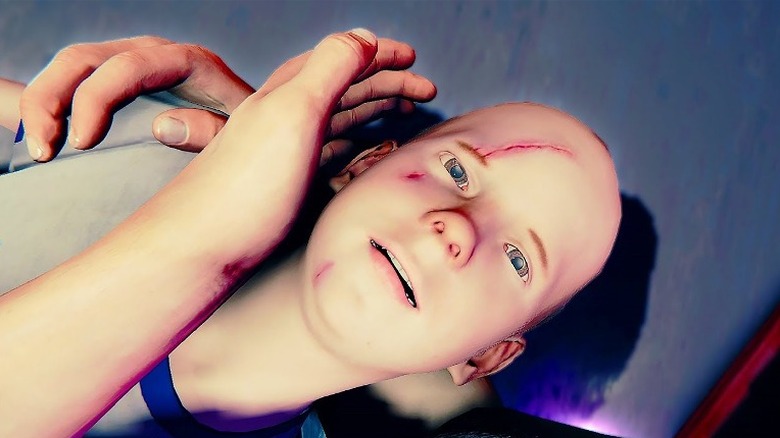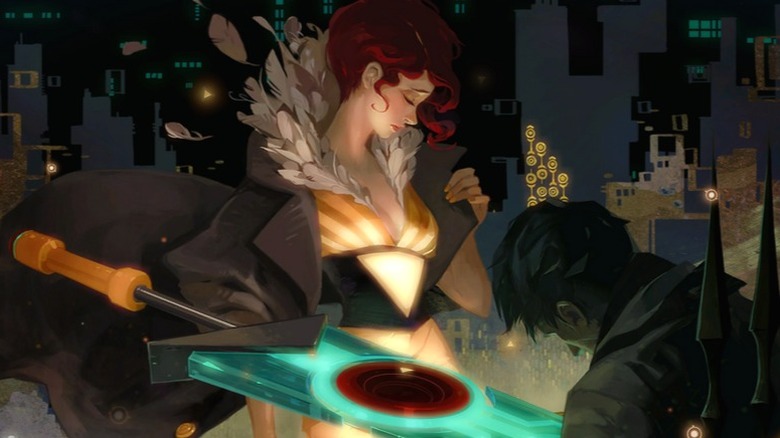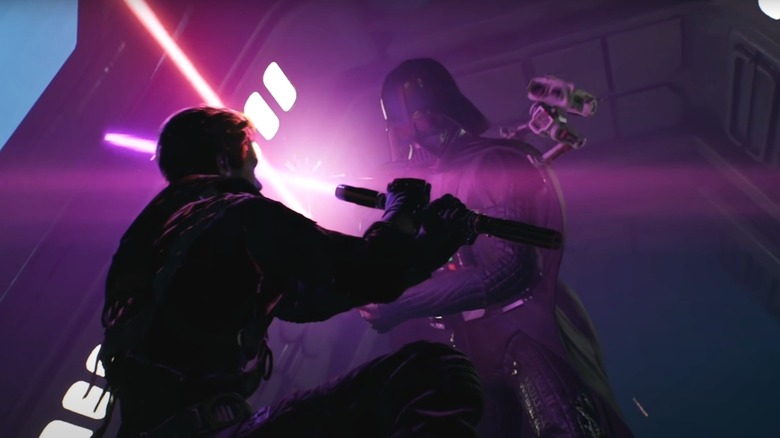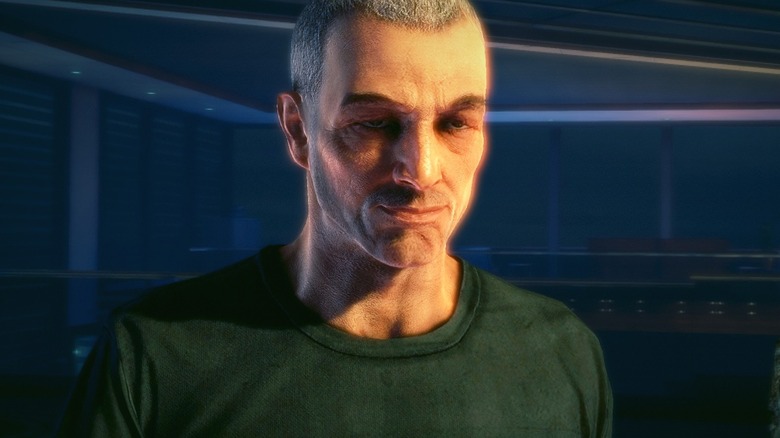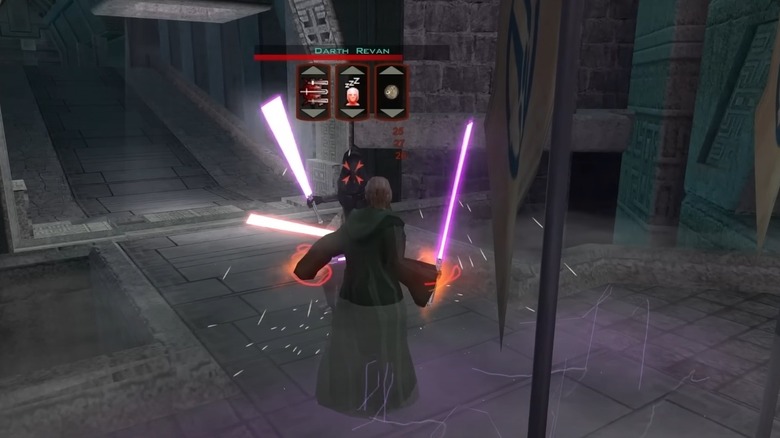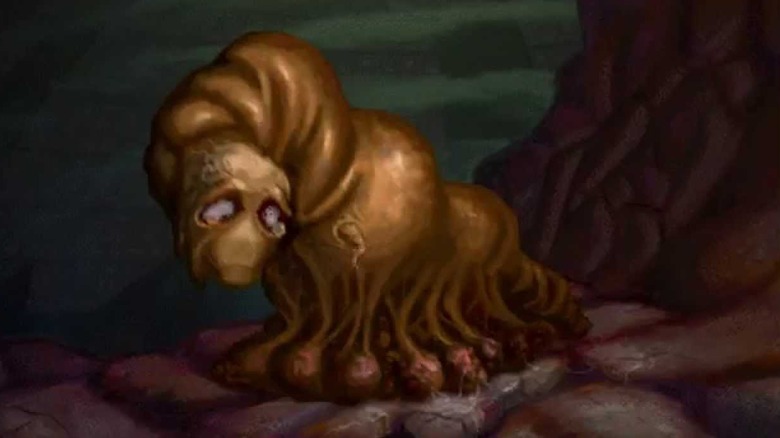Terrifying Video Game Endings That Still Haunt Us
The best games have endings that stick with us long after the final credits stop rolling. Sometimes it's because they say something profound, while others can be more confusing and leave the player wondering about them for days (or even weeks) afterwards. Some endings stay with us because they're downright terrifying. Even beyond the horror genre, video games just have the ability to scare people like few other mediums can, especially thanks to their interactivity.
Whether it's through extreme gore and violence, jump scares, or just plain old intimidation, some games end in a way that can leave players shaking. Other games have endings that upset players in ways that are more subtle, making gamers consider the horrors innate to their own existence. Others emphasize the player's powerlessness in the face of things greater than ourselves. However they did it, here are some video game endings that terrified players so much, they still stick with us today.
Bloodborne
"Bloodborne" is a game that revels in tragedy and gruesomeness. Throughout the story, the player is confronted by a huge variety of horrifying enemies. Not only is "Bloodborne" totally okay with making players as uncomfortable as possible, but it actively seeks to do so. It's only fitting that a game of this nature would have a suitably horrifying ending — or three endings, in the case of "Bloodborne." One ending isn't all that scary, but the other two absolutely are.
Both of the more terrifying endings require the player to reject an offer for the old hunter Gerhman to "kill" the protagonist. After defeating Gherman, the player is confronted by the Moon Presence, one of the extra-dimensional Great Ones. The first of the scarier endings sees the Presence overwhelm the Hunter with its power, forcing the protagonist to take Gehrman's place. This begins the cycle all over again, dooming the Hunter to lead others like them into the same horrors, the same abyss of nightmares, that the player just fought through.
The other ending only occurs if the Hunter consumed three umbilical cord pieces found throughout the game, which will allow the player to fight the Moon Presence. After this, a cutscene is shown of the Hunter having transformed into a writhing, helpless slug — an infant Great One. This is the closest thing "Bloodborne" has to a good ending. If that isn't equal parts disgusting and terrifying, nothing is.
Dead Space
"Dead Space" is considered one of the all-time great horror games for a reason. The Ishimura space station is one of the most terrifying settings in gaming. The game is full of viscerally horrifying encounters and perfectly-timed jump scares that keep players on edge through almost the entire story. The ending does not let up on the gas pedal of terrors for one second, either.
The original ending sees Isaac escaping the Ishimura, only to be attacked by a hallucination of his dead girlfriend, Nicole, on his ship. But even more upsetting is the remake's alternate ending, available only to players who complete a New Game + playthrough. Here, instead of being attacked by Nicole, Isaac has covered his escape shuttle in the strange language encountered throughout the game, and calmly talks to his hallucination of her about "building something new."
In either ending, the message is the same: There will never be an escape for Isaac. He will always be followed by what happened on the Ishimura. Many of us humans always feel haunted by the horrors of our past. Isaac is no different, but he also has to deal with actual space monsters.
Baldur's Gate 3
"Baldur's Gate 3" isn't really a horror game and it doesn't contain the kind of jump scares one might associate with the genre. It certainly has no issues with extreme amounts of gore and body horror, though. Between the Elder Brain itself and the characters that get transformed into vicious Mind Flayers, there is no shortage of upsetting imagery. This reaches a peak at the end of the game, in one of two different ways: The first comes if the player tries to confront the Elder Brain before gathering all three Netherstones. A cutscene will play in which the player is transformed into a Mind Flayer and joins the hive. It's not a proper ending per se, as the player is then prompted to reload the game and try again from that point.
This transformation can occur in several game-ending story beats, however, if the player rejects the Emperor's help before the final battle. In this case, someone else will need to become a Mind Flayer. That can be the player character or one of his trusted companions. Either way, watching someone transform into a Mind Flayer — quite literally being stripped of their body possibly even their soul — is enough to make just about anyone wince. To know that it is inevitable and necessary to prevent the Elder Brain from destroying the world, all because of a choice you made, makes it all the more terrible to watch.
Doki Doki Literature Club
"Doki Doki Literature Club" is absolutely a horror game, but it disguises itself as an innocent visual novel dating sim. The game has become somewhat infamous for catching uninformed players off-guard with not only how dark it gets, but how suddenly it makes the transition from cute dating sim to disturbing meta horror story. This shift sets players on edge the entire rest of the game, wondering what dark, depraved twist might come next.
After this twist, the game seemingly starts to break and glitch. These are not bugs, but the "manipulations" of Monika, one of the game's characters. She's become self-aware, she knows she is in a game, and she has started toying with the game and the person playing it – you.
From here, "Doki Doki Literature Club" has several endings, but by far the scariest and most depressing is the one in which Monika decides all her efforts are pointless and tells you "no happiness can be found" in the game. She then deletes the entire save file. From her perspective, she was just a side character in the game, much as we can often feel directionless characters in our own lives.
The Forest
"The Forest" starts as one of those classic "stranded in the wilderness" survival-horror games, but quickly morphs into something far darker. As the main character, Eric, tries to save his kidnapped son following a plane crash that left them both stranded, he stumbles into a world far stranger than he could have imagined. Surrounded by bizarre and gross-looking humanoid creatures, he finds himself slowly uncovering the secrets of the peninsula he crashed on.
Eventually, Eric is left with a haunting choice: Save his son Timmy or allow him to die. Choosing the latter will instead save hundreds of people aboard a passing airliner from the same fate that befell Eric and Timmy. It cuts right to the heart of what it means to do anything for your family, and asks us as players to figure out what cost is worth paying to save your own child.
Things get even more morally gray in a subsequent cutscene that plays if you choose to save Timmy. Here, Timmy begins to shows signs that he's becoming one of the creatures Eric's been fighting. There is no right choice here, there is no good ending. Do you save hundreds or save your son? Do you save your son, only to risk him becoming a monster? "The Forest" leaves players with only bad feelings.
Transistor
The ending of "Transistor" presents players with a very different type of horror than the previous games on this list, but it's no less potent. Throughout the story of "Transistor," players never really get a great sense of what the main character, Red, is fighting for. We know she wants to get her voice back after having it taken from her at the start of the game, and she wants to stop the robotic force called The Process from destroying her city. It's obvious, however, that there's more underneath the surface.
The first man the Transistor sword absorbed, who has been your guide from inside the weapon the whole game, was the man Red loved. She wanted to restore the city in order to bring him back, but she can't. He is trapped inside the sword. In the end, the player is helpless as Red takes the sword and stabs herself with it, trapping herself inside the virtual world of the Transistor in order to be with him.
It's hard to stop yourself from screaming as Red moves to impale herself, to not try to reach through the screen and stop her. We are as helpless as she feels, despite everything she's done. This is the one thing she truly wants and she can't have it any other way.
If you or someone you know is struggling or in crisis, help is available. Call or text 988 or chat 988lifeline.org
Star Wars Jedi: Fallen Order
"Star Wars Jedi: Fallen Order" is definitely not a horror game – at least, not until you get to the very end. Players spend the entire game powering up Cal Kestis, learning new Force techniques, becoming a better lightsaber combatant, and training as a Jedi. Players watch him grow as a person, becoming not just a real Jedi, but the ideal of what a Jedi can be.
As Cal battles his way through Fortress Inquisitorious, players begin to feel incredibly powerful, almost unstoppable. Defeating the deadly Trilla in a duel is an incredible high, the culmination of all the skills and knowledge built throughout the game. Then suddenly, Trilla becomes so afraid she can't even move. That's when you hear the iconic breathing of Darth Vader.
Despite how powerful Cal has become over the last several hours of play, the game leaves you with only one option: to flee in the face of Vader's power. Short of the "Rogue One" hallway scene, this is Darth Vader at his best. He's so overwhelmingly power that it's terrifying. No matter what Cal does, he knows there's no chance of survival in a duel against the Sith Lord.
Portal
"Portal" is considered by many to be among the best games ever made. Its story, mechanics, and even its soundtrack are all considered among some of the most memorable in gaming. Its ending is no exception to that greatness. Chell, having defeated the mad AI GLaDOS and her many puzzles and tests, is finally free. Chell finally sees the light of day upon being thrown from the Aperture Science facility by an explosion. Everything looks peaceful, the sky is blue, birds are chirping — and suddenly a robot comes from behind Chell and drags her back inside.
It turns out that Chell didn't defeat GLaDOS. In fact, GLaDOS is happy, as she explains in her ever-so-creepy and infamous song "Still Alive." The experiments she performed on Chell were successful in achieving their purpose. To watch Chell come so close to freedom, believing it was hers and then being literally dragged back, is as shocking as it is deflating. GLaDOS even mocks Chell, giving her the cake she was promised at the beginning before snuffing out the candle on top. The whole ordeal was all just an experiment, and Chell's been reduced to a human lab rat.
Spec Ops: The Line
"Spec Ops: The Line" is a bold game, one that's meant to challenge the player at every turn. It's also not subtle in its messaging: The player, via main character Martin Walker, is forced to commit and observe one terrible act after another. "Spec Ops: The Line" wants you to question the morality of everything Walker sees and does in his mission. It wants you to question how we as a society treat war, both in games and in the real world. Still, players want to believe that everything Walker does is for the greater good, right up to the shocking ending.
Walker finally reaches the game's villain, Joseph Konrad, hoping to stop the horrors he's inflicting on the ravaged city of Dubai. Except it turns out that Konrad is dead. He's been dead the whole time.
It was all Walker, the entire game. All the horrors, all the deaths, all the unnecessary bloodshed, all the war crimes were carried out by the player character after losing touch with reality. This is the reality of war that "Spec Ops" wants to show the player. In each ending of "The Line," there are no good guys, there are no heroes; only killers; only death. There is no redemption for Walker's crimes, no matter what.
Star Wars: Knights of the Old Republic 2
"Star Wars: Knights of the Old Republic 2" explores the horrors of the Dark Side of the Force in a way that few other pieces of "Star Wars" media do. The Jedi Order has been all but destroyed, the Jedi Exile's connection to the Force has been cut off. The Sith responsible for these tragedies — the zombie-like Darth Sion and the inconceivably powerful Darth Nihlus, who can consume the life of any living being and even the Force itself — are horrifying in ways "Star Wars" fans had never quite seen.
Throughout the game, all the player character encounters is hopelessness. The remaining Jedi attempt to permanently cut them off from the Force. Kreia, the closest thing to a mentor the Exile has, betrays them. The galaxy is consumed by darkness, and it's essentially the protagonist's fault. The tough decisions of the past — made to end the Mandalorian Wars — are the reason behind it all.
There is no happy ending in "KOTOR 2." Upon defeating Kreia, the Exile listens to her as she relays a vision of all the horrible things yet to come in the future, and you know it's all true. She warns the Exile of the fates that await the people and places they've helped or hurt, saved or destroyed, throughout this journey. With this cliffhanger ending, it seems it all meant nothing. The Exile changed nothing, and the darkness is still growing in power.
I Have No Mouth, and I Must Scream
"I Have No Mouth, and I Must Scream" is an adventure game from the 90s that a lot of modern gamers may have missed. It's inspired by Harlan Ellison's classic short story about an evil AI that ends the world and keeps a handful of humans alive for its twisted experiments. The game somewhat follows the original tale, but follows separate storylines for each character. Each section of the game sees the characters being forced to confront their flaws by AM, the AI torturing them for its own entertainment.
The endings vary wildly: Some see the protagonists defeating AM and restarting human civilization, while others (like the source material) end with one of the player characters being turned into a blob of jelly. Really, there are no outright good endings; even the one where you save humanity concludes with one of the characters endlessly roaming the lonely realm of cyberspace to ensure AM never returns, while the rest die.
Even in the best ending of the game, it's made clear any sacrifice the characters made, any growth they showed, any closure they found in their lives was never going to lead anywhere for them. At best, they won and were personally rewarded with nothing. At worst, they fought as hard they could and still lost. They still want to scream into the void and they cannot. Even if they could, there would be no one left to hear.

